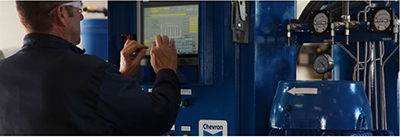Worse for the wear: Comparing a typical hydraulic oil to certified clean hydraulic oil

Can a hydraulic oil that is certified to the OEM’s ISO cleanliness standards really make a difference in equipment performance?
In an earlier article, we shared some test results showing that reliance on the equipment filters alone to meet oil cleanliness requirements could lead to a high level of equipment damage, compared to using a certified clean oil in the first place. We have observed that contamination levels in typical hydraulic oils can cause a lot of other problems short of out-and-out equipment failure. It can cause equipment to be sluggish and inefficient, require more frequent maintenance, and ultimately have an impact on production that translates to the bottom line.
As we previously reported, we tested Chevron Rando® HD ISOCLEAN® Certified hydraulic oil against a typical hydraulic oil through an Eaton high pressure vane pump typically used to measure performance standards of hydraulic oils. When we examined the pump parts, we noted that the pump vane, rotor and side plates suffered significant wear, cavitation and erosion generated by the use of a typical hydraulic oil, even with the equipment filter working.

In contrast, the parts lubricated by the Chevron Rando® HD ISOCLEAN® Certified hydraulic oil looked near new after 150 hours. The contrast was quite dramatic.
What makes particle contamination especially insidious is that the particles that pose the most risk are those that cannot be seen with the naked eye. In today’s precision equipment with extremely tight clearances, particles as small as one to 10 microns (millionths of a meter) can cause severe, performance-impairing damage. You can minimize the risk of damage by knowing and adhering to the equipment and component manufacturer’s specifications for oil cleanliness. Using an oil certified to the ISO cleanliness code for your application is the right place to start.
In a future posting, we will look at how oil cleanliness can affect hydraulic system pressure efficiency, which has a direct effect on equipment performance and production.
07/05/2018


























